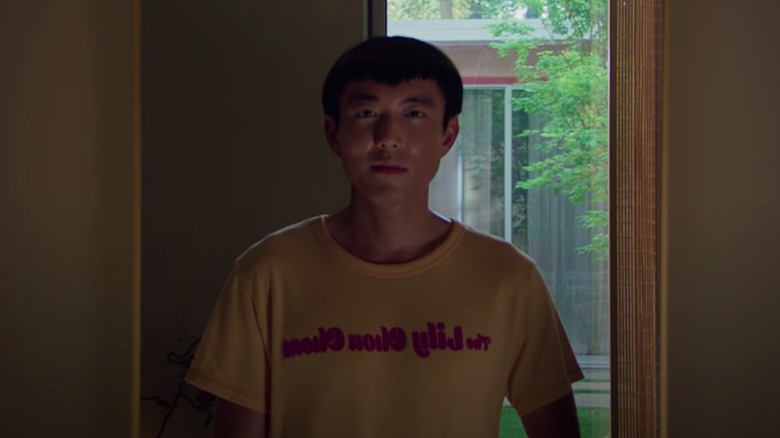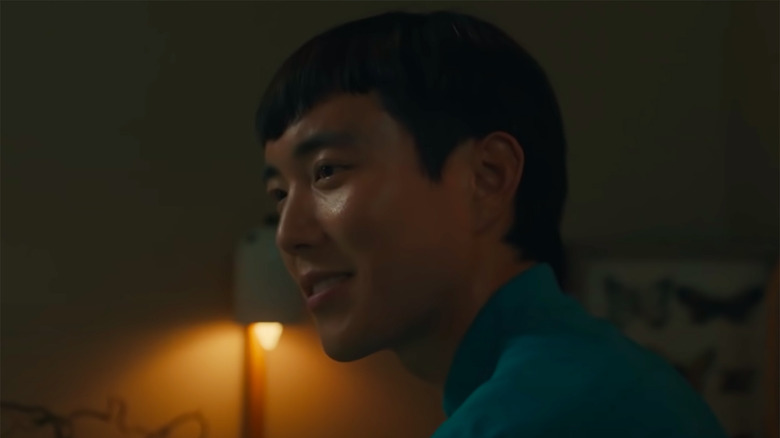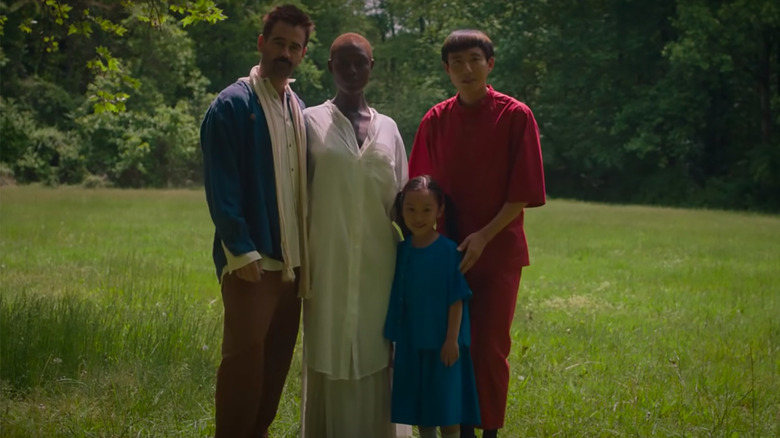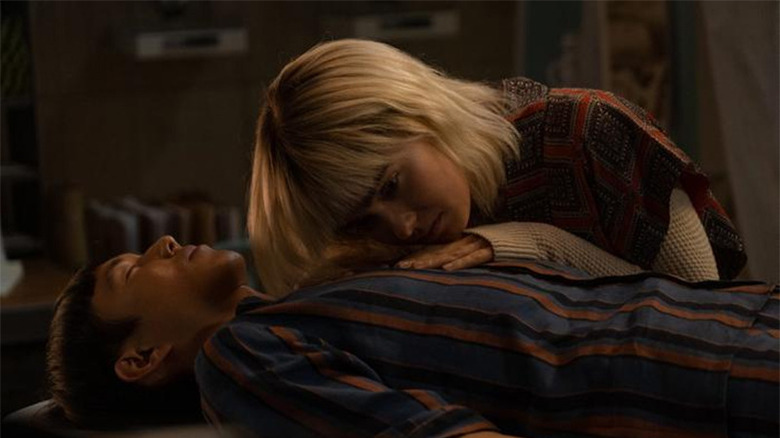After Yang's Justin H. Min On Figuring Out How To Play An Android, The Scene That Destroyed Him & More [Interview]
If you're not clamoring to see "The Batman" this weekend, but you're looking for something new and amazing to occupy some of your time this weekend, you can't go wrong with the phenomenal sci-fi drama "After Yang," directed by "Columbus" filmmaker Kogonada.
"After Yang" stars Colin Farrell and Jodie Turner-Smith as Jake and Kyra, a pair of parents who purchased a big brother android (Justin H. Min) as a way to instill more Chinese heritage and culture into their young, adopted daughter Mika (Malea Emma Tjandrawidjaja). Their family is forced to reflect on their relationship with each other and Yang himself when he suddenly malfunctions — and there doesn't seem to be a way to repair him.
Leading up to the release of the film, in theaters and on Showtime today, /Film spoke with Justin H. Min about his outstanding breakthrough performance in "After Yang," including the process of figuring out how to play an android that's on the verge of feeling genuinely human, the scene that had him sobbing on a plane when he read the script, and much more. Check it out below.
"I was on this plane ride and this wave of emotion from reading the script washed over me."
I wanted to start off by finding out how you came to be involved with the project. What was it about the script that made you want to join?
It was a pretty standard process in terms of how it works as an actor in Hollywood. My manager sent me the script because he had read it and thought it was a great script. He actually said it was the best thing he had read in a really long time and thought I could potentially play the title character. I said, "Sure, I'll read it." But I was getting on a plane, so I was like, "I'll read it on the plane ride." I opened the title page and it was Kogonada, so immediately my expectations kind of shot through the roof, because I had been familiar with his visual essays. I obviously loved "Columbus," so I was like, "Okay, wow! I didn't even know he was already making a second feature. This is really exciting."
Normally when you have high expectations, you're sort of disappointed, but it actually really exceeded my expectations. I was on this plane ride and this wave of emotion from reading the script washed over me and I started sobbing, and the woman next to me was like, "Are you okay?" I cried, "Yes, I'm fine." I immediately got off the plane, I told my manager, "I'll do whatever I can to get involved, or to read for this part." I ended up putting myself on tape, didn't hear anything back.
A few weeks later, I was told that Kogonada wanted to meet with me for coffee. It was like going on a first date, I was so nervous. I was probably rambling, but this coffee day, which was originally scheduled to be 30 to 45 minutes, ended up being three hours, and we talked about life and his work and the movie. We just really connected on all of these levels. You would think that he would offer it to me after that, but he was like, "I love you, Justin. I consider you a friend, but I need you to audition one more time." So I went back home. He wanted me to put a second scene on tape. So I did it. And then a few days later I got the call, and I was just ecstatic.
Of course!
To answer the second part of your question, the thing that drew me to it was that it really explores a lot of the things that I have been grappling with for a large part of my life, which are things like, "What does it mean to be Asian American? Why am I Asian American, and how does that manifest itself out daily?" Themes with regards to family and being a son and, obviously, I'm a sibling as well. So being a brother and what does that mean? Themes connected to loss and all of these things that I've grappled with and thought about for many, many days. So to see a film explore these things in such a nuanced, beautiful way. I was like, "I would love to be involved in this some shape or form."
"He was perfectly fine being a robot."
Do you remember if there was a specific part when you were reading the script that really hit you hard?
Yes, yes. I remember very vividly. It's the scene with Yang and Kyra, and he says, "Can I be honest with you?" She says, "Is that something you can or can't do?" He takes a moment and says, "I'm fine if there's nothing in the end." That line just destroyed me because here was a guy, here was a robot, who was just so perfectly happy with his current circumstances. He was perfectly fine being a robot. He was perfectly fine, essentially being, for all intents and purposes, a babysitter, a maid, all of these things for this family, a teacher, a tutor. And he just was so happy. That was his role.
I just couldn't get over that because all of my life I've been taught to believe that we should always be striving for more, more, more, more, more. As an actor, you get sucked into that too. What's the next project? What's the bigger project? What's the next amazing director you want to work with? It gets incredibly exhausting and all-consuming. To read this character who was just fine with these that — from the outside world — might seem like very meager circumstances, was so beautiful. And it really, really stirred me in that way.
Speaking of playing a character who is — they say, techno, or they say bot — how do you prepare for a role like that? What's the process of determining how to portray an android that is supposed to be very advanced but not necessarily completely the idea of human?
It's funny because that was the first question I asked Kogonada. I was like, "Okay, you need to tell me. How 'robot' do you want me to play this character, how human you want me to play this character?" He was just so coy about it. In retrospect, I realize that he was doing that all strategically because he didn't want me to have a sure answer of how human or artificial this was. It was always supposed to be this balancing act where you can't quite pinpoint it. So even while we were filming, I was still unsure. I think it's the unsureness that actually is the thing that we want most, because even Yang is unsure at times about how artificial he is and whether or not these emotions that he's experiencing are real or not.
All that to say my preparation work was a lot of internal stuff. It was not necessarily about how do I turn my head and speak with a certain voice to make me sound artificial. It was way less about that and more about, "How does this character relate to each of the family members? How does he feel about each of the family members? How does he relate to his own self and his own identity?" And I wanted to fill Yang with as much life and secrets that would never come to light on screen. He never says any of these things on screen. I wanted there to be that life behind those eyes.
The last thing I'll say is the only thing that I really brought to the artificial aspect of it all was a sort of intentionality. I just kept thinking to myself, What would it be like to navigate the world where I am hyper-aware and hyper-focused on every single movement I make in my body and every single word that comes out of my mouth?" So much of our lives, we're just unconsciously moving through it, saying things without thinking, turning our heads, and bending down without thinking. They're all habits. And I just thought, "Okay, a robot is not a creature of habit. A robot is so intentional about every single thing that he says or does. So let me try to bring that sense of that, into playing this character." So that's kind of how that all evolved and took shape.
"He was the glue that sort of kept them together..."
That's very cool. I didn't really think about this until you said it, but there's absolutely a subtle difference in the way Yang acts with each individual family member. He's obviously more nurturing towards Mika. And then with Colin Farrell's character, he almost feels like he is eager to please him, to make him feel like he is human.
I'm so glad that showed up and you saw that, because that was exactly what I wanted to hopefully try and convey in each of those flashback scenes — with each of the family members, a different energy, in essence, coming from each of them. I built it in that each of the family members told Yang things that they would never tell anyone else. In many ways, he was the glue that sort of kept them together because, even though they could not connect with each other, they could connect with the Yang in some shape or form.
So those were all things that I brought into each of those scenes. I worked with an acting coach, and it was really helpful. We sort of had different fabrics that represented each of the family members, and even texturally, to feel different things in a tactile way, for Yang and each of them, I sort of wanted to bring that in and bring that to life on screen as well.
Did Kogonada key you in at all to the kinds of imagery he was going to use for Yang's memory outside of those featuring you with Mika, Ada, or the rest of the family?
Oh, absolutely not, which is why it was so beautiful to see them on screen. I was experiencing them for the first time as an audience member. It's really interesting, the whole idea of splicing the memories into these fragments. As you know, some lines are repeated and things like that. We had no idea that he was going to do that. A perfect example of that is the scene with Yang and Kyra. I had no intention of going into that scene with Yang becoming sort of emotional. In that moment, I was really trying to restrain myself the entire time, because I just didn't think that this robot would experience emotions in the same way that humans would. So I kept restraining that, and yet, as that scene just played out, it just came out because it was just such a real, authentic moment that these two characters were having, and the words just felt so alive.
So we finished that take, and I was incredibly emotional, and I needed some time. I thought to myself, "Well, that was really fun, but that's for sure never going to make the movie, because there's no way he could use that." And the way in which, after I saw it come together, he was able to splice those moments together — suddenly he's emotional and then suddenly he's not — it was just so masterfully done, and again, keeping the mystery alive of how human or artificial this character really is.
"There will be a day where I will be nostalgic about even these mundane things."
Speaking about the memories, since you didn't see them until they unfolded in the movie, after seeing the movie, did this have any effect on your perspective on your own memories, as far as just determining what things are worth remembering or how you remember them? There are so many ordinary things in here that you might not ever give a second glance to that are given such beauty.
You nailed it. That's exactly what happened after I finished the movie. I hate to use the word timely, because what does that even mean? But in the age of the pandemic still raging on, to a certain extent, it's like we were forced to do that. These things that had become so habitual and part of our lives were suddenly taken away from us, like going to a movie theater, going to have a meal with friends and family, getting on an airplane. With all of that taken away and with the world being put at a standstill, we were forced to see things in a way that we had never seen before. That is, hopefully, what the movie does is as well. So yeah, for me, when I try to live my life, these are things that still stay with me today. I try to have moments where I stop and think, "This might feel mundane, but there will be a day where I will be nostalgic about even these mundane things." And I want to be able to savor looking at the blue sky, walking on the street, whatever it might be.
"After Yang" is in theaters now, and it's also available on Showtime.




